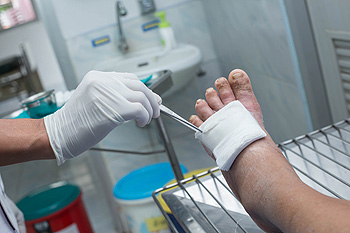
(616) 846-3400
Fax: (616) 846-3406

(616) 846-3400
Fax: (616) 846-3406

Offloading practice for foot wounds refers to alleviating pressure and stress on injured or ulcerated areas of the foot. Offloading involves the strategic redistribution of weight to prevent further damage and promote healing. This method is particularly critical for individuals with diabetes or other conditions that affect circulation and reduce sensation in the feet. The essence of offloading lies in its ability to relieve pressure from vulnerable areas, allowing tissues to recover and regenerate without constant irritation or trauma. Offloading practice uses specialized footwear, orthotics, or other assistive devices to encourage healing and helps prevent wounds from getting worse. Additionally, it emphasizes the need for close collaboration between patients, caregivers, and podiatrists to optimize treatment outcomes. If you have diabetes and have a foot wound that has become ulcerated, it is strongly suggested that you are under the care of a podiatrist who can help you to manage this condition.
Wound care is an important part in dealing with diabetes. If you have diabetes and a foot wound or would like more information about wound care for diabetics, consult with Dr. Robbi Young from Grand Haven Foot & Ankle. Our doctor will assess your condition and provide you with quality foot and ankle treatment.
What Is Wound Care?
Wound care is the practice of taking proper care of a wound. This can range from the smallest to the largest of wounds. While everyone can benefit from proper wound care, it is much more important for diabetics. Diabetics often suffer from poor blood circulation which causes wounds to heal much slower than they would in a non-diabetic.
What Is the Importance of Wound Care?
While it may not seem apparent with small ulcers on the foot, for diabetics, any size ulcer can become infected. Diabetics often also suffer from neuropathy, or nerve loss. This means they might not even feel when they have an ulcer on their foot. If the wound becomes severely infected, amputation may be necessary. Therefore, it is of the upmost importance to properly care for any and all foot wounds.
How to Care for Wounds
The best way to care for foot wounds is to prevent them. For diabetics, this means daily inspections of the feet for any signs of abnormalities or ulcers. It is also recommended to see a podiatrist several times a year for a foot inspection. If you do have an ulcer, run the wound under water to clear dirt from the wound; then apply antibiotic ointment to the wound and cover with a bandage. Bandages should be changed daily and keeping pressure off the wound is smart. It is advised to see a podiatrist, who can keep an eye on it.
If you have any questions, please feel free to contact our office located in Grand Haven, MI . We offer the newest diagnostic and treatment technologies for all your foot care needs.